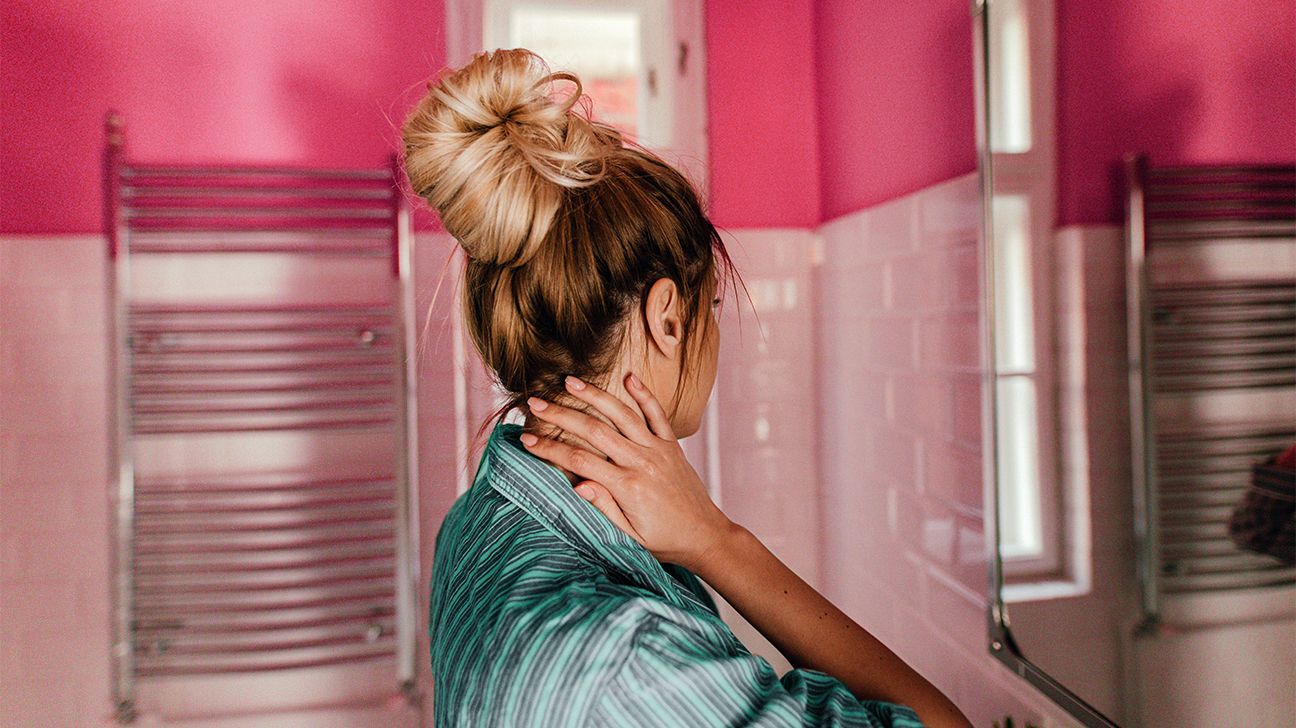Apple cider vinegar is our health-happy BFF in so many ways. UTI help? Check. Dope salad dressing? You know it. But dare you put apple cider vinegar in your hair?
Apple cider vinegar boasts beaucoup health benefits. In terms of hair it’s thought to:
- enhance scalp health
- help an itchy scalp
- strengthen hair
- boost shine
Here’s how ACV might help you get healthier hair.
Even though ACV has been hailed (by the internet mostly) as a universal home remedy, there’s an underwhelming amount of the research backing up many of its claims. But there are some science-backed ACV benefits for your hair.
Balance your hair’s pH
Apple cider vinegar is made from (you guessed it!) apples. They’re fermented using a method that fuses the fruit with live cultures, minerals, and acids. This mean ACV has a lot of acetic acid.
Dull or frizzy hair is usually higher up in the pH scale so an acidic wonder like ACV may help balance things out. It can strengthen your hair and increase its va va voom factor.
Antimicrobial action
Some peeps use ACV to clean (and with good reason). It’s a natural enemy of bacteria and fungi. And guess what? It can do the same thing for your hair, too.
Has your scalp gone a bit out of sorts lately? ACV can fight the fungi and bacteria that could be causing that itch.
Buildup be gone
Some folks claim there are vitamins and minerals in ACV that can wash away product and oil buildup. There’s also a lot of buzz about ACV’s alpha-hydroxy acid levels. Peeps think it can help exfoliate the scalp. Keep in mind, there’s not a lot of research to back this. But it can’t hurt to try it out!
Death to dandruff
Studies show ACV has certain anti-inflammatory properties. That means it might help with itchy, flaky dandruff (aka seborrheic dermatitis).
What about hair growth?
A lot of bloggers and social media gurus claim ACV is the MVP of hair growth. But there’s no hard evidence to back this up… yet. Stay tuned.
Using a DIY hair rinse is as easy as A, C, V (get it?).
- Mix two tablespoons of ACV with a cup or 2 of water (enough to pour over your head).
- After your normal shampooing/conditioning routine, pour the mix over your hair evenly.
- Gently work it into your scalp.
- Let it rest there for a few of minutes.
- Rinse it all out.
If you dig the result, feel free to add this rinse into your hair routine. Twice a week should do the trick.
P.S. If the smell just isn’t your thing, try adding a couple of essential oil drops to the rinse. (Just make sure to patch test ’em first!)
If you’ve ever woofed down vinegar fries at a carnival before you know vinegar can be irritating. That’s because it’s brimming with acetic acids which can aggravate or even burn skin.
The goal is for ACV to up your hair’s wow factor 🤩. If the rinses are making things worse, drop it like it’s hot. You might be using too much ACV or doing rinses too often. Thankfully, if your skin does have a bad reaction it should clear up on its own in a day or 2.
ACV PSA:
Always dilute your ACV with water before using it on skin. Limit the ACV to 5 tablespoons max when doing a rinse.
Never let ACV anywhere near your precious eyeballs. If it accidentally happens rinse your peepers ASAP.
ATM, there’s not a whole lot of research to prove ACVs benefits on hair. But there are some solid studies that could support certain claims.
For example, ACVs ability to possibly lower pH in order to improve hair health is legit. One study on shampoo pH reported that high alkalinity can add to hair breakage, friction, and dryness.
The study also claimed that the majority of hair care products don’t tackle hair pH like they should. Most shampoos are likely to be alkaline.
What we know for sure…
- ACV does have minerals like manganese, calcium, potassium, and iron.
- Since ACV is hella acidic, it has the potential to help balance pH. Plus, by boosting acidity and reducing the pH it may help with smoothness, shine, and strength.
- ACV’s antimicrobial superpowers are backed by some reliable research. So ACV may prevent scalp problems from bacteria or fungus. This might help with an itchy scalp.
What we don’t know yet…
- There’s little to no evidence to prove ACV has vitamins and minerals that can influence hair growth.
- There’s nothing to back claims that ACV holds alpha-hydroxy acid (AHA).
- More studies need to test ACV’s anti-inflammatory properties.
Apple cider vinegar hair rinse is almost science approved. No matter what hair type you’re rockin’ give it a chance. It may strengthen your hair while enhancing shine. There’s also a chance it can help with scalp infections and itchiness. Why not give it a go!


